Community

Amanda Gross describes herself as a “weaver of things and people.”
Gross, a fiber artist based in Pittsburgh, Pa., has been weaving things — from quilts to bags to skirts — for years. But, as a “weaver of people,” Gross completed her biggest project yet this fall.
Gross is the head artist behind the Knit the Bridge project, a massive community effort that covered the Andy Warhol Bridge in Pittsburgh with knit and crochet panels. From August to September, Knit the Bridge workers installed 600 handmade blankets across the 1,061-ft. long bridge.
When introducing people to hacking, Ali Llewellyn often brings up Apollo 13. “Remember that scene where they dump everything on the table and say, ‘We have to 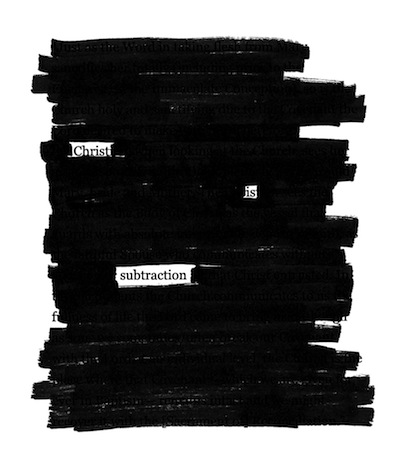 find a solution, with only these materials?’ And there’s, you know, duct tape? That’s all it is! Hacking is building a way to go from here to there.”
find a solution, with only these materials?’ And there’s, you know, duct tape? That’s all it is! Hacking is building a way to go from here to there.”
She should know. After studying church planting and social mobilization, Llewellyn went on to spearhead community engagement for NASA’s Open Innovation Program and is now a Senior Program Manager for SecondMuse, equipping hackers and non-hackers alike for the upcoming National Day of Civic Hacking.
Llewellyn’s dappled journey — from biblical scholarship to tech-minded collaboration — reveals a potent lens that Christians across denominations are using to repurpose, mobilize, and reform the church. In hacking, they see a model for the future of Christianity.
The term “hacking” has undergone a recent transformation in the popular lexicon, back to its amorally general origins as a method of discovery and recombination. For every Heartbleed-like scare today, there are innumerable cheery Buzzfeed tips to hack your life; and while the digital bandits of Anonymous capture our imagination, “hackathons” — community-oriented workshops to solve urban challenges — have popped up in many major cities.
With this broadened interpretation, Christian interest in hacking finds context. Just as faith systems give parameters to our spiritual imagination, so technology directs our inquiry into the universe and, increasingly, our connectedness to each other. Early Christianity spearheaded technological innovations with global ramifications, most notably in the invention of the codex. Today’s faithful hackers, armed with code, workshops, and participatory-minded theology, hope to do the same.
“THE CHURCH radicalized me,” celebrated author and ordained Episcopal deacon Denise Giardina once said, describing how she sees herself as both social activist and servant minister. “The phrase in the prayer book is ‘Interpret the world to the church and the church to the world.’ It’s a totally different way to advocate, with a spiritual point of view.”
This philosophy has shown up in her bestselling novels, published over her long career, such as Storming Heaven (1987) and The Unquiet Earth (1992), which chronicle the history and social impacts of coal mining in Giardina’s native Appalachia; Saints and Villains (1999), which tells the story of Dietrich Bonhoeffer’s resistance against Hitler and the Nazis; and, most recently, Emily’s Ghost (2010), a reimagining of Emily Brontë’s story and how her life was changed by her encounter with an ardent member of the clergy.
Shortly before her recent retirement from teaching creative writing at a West Virginia college, Giardina talked with Jason Howard, author of A Few Honest Words and coauthor of Something’s Rising, about her literary career, social justice activism, and her time in the late 1970s in Washington, D.C., as a member of Sojourners community (the intentional Christian community that founded Sojourners magazine and other ministries).

“Innovation” is a warm and fuzzy word — until you dig inside it.
It’s like “community,” a warm and fuzzy term when taken to mean friendships, sharing, common interests, common values, perhaps working together.
But from a gospel perspective, “community” means much more. As Jesus modeled community, it means mercy — turning away from our instinct to judge and to punish. It means compassion — giving to the least, even when our instinct is to disdain.

Last week as I was scrolling through my Facebook news feed, I came across a post from Dr. Timothy Keller, one of the founding members of The Gospel Coalition, who has been known for his very intellectual and reasonable perspective on a variety of issues that his other conservative colleagues have not been so balanced on. However, one of his recent comments surprised me, seeming to further a false narrative about millennial evangelicals that we are a generation of spineless, selfish, and scared hipsters:

I immediately was taken aback when I came across this post. As a millennial who has been actively involved in the conversation surrounding what faith, life, and church will look like for my generation, it is abundantly clear that the image that Keller paints has little to no grounding in reality. In fact, I would argue that one of the biggest desires of millennials is that we would be involved in deeply intimate communities that allow us to express ourselves openly, ask the questions to arise in our minds without fear of judgment, and give us a tribe of people that will walk with us through the ups and downs of life. In fact, this desire for intimate community is a direct response to the lack of community we have grown up with, especially in the evangelical world with our sterile megachurches that make true community nearly impossible.

And church news is little different: pastor so-and-so is embroiled in a moral failing; church such-and-such fired its pastor over leadership differences; and the seminary down the street let go a professor over theological issues. The list goes on and on.
Isn’t it time for something different?
How about a little good news? What about a viral campaign about churches doing well? Well, here is my modest attempt to say a good word about our church community.

A few years ago, I was browsing a bookstore and wound up in the “Spirituality” section. While scanning the titles, I noticed something that struck me as ironic and funny.
At one end of a shelf was a book by an ardent and dogmatic atheist. At the other end of the same shelf was a book by an ardent and dogmatic fundamentalist.
Two books, same shelf.
And in many significant ways, two peas in the same pod, no?
The atheist and the fundamentalist needed each other as foils to sell their books and make a lot of money. They both had a vision of life that was black-and-white. Both thought they had infallible answers to life’s biggest questions.
Matching bookends indeed.
Don’t most of us live somewhere in-between?
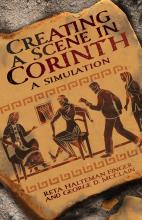
ONE YEAR MY small group decided to have each member choose a person named or alluded to in the gospels to “follow” during Lent. We researched our people and the customs of that time and reflected individually and collectively on their encounters with Jesus. Then we hosted a community meal for family and friends on the night before Easter. Each member of our group came in character as the person we’d studied and tried to recreate the mood of that frightening, confusing, grief-filled night for followers of Jesus after his death and before his resurrection. After the meal, each of us presented a monologue that tried to project what our person might have been thinking and experiencing at that time.
The attempt to immerse mind, soul, and body into scriptures that I had listened to for much of my life (but perhaps hadn’t really heard) was a transformative experience: It burned away long-held assumptions and revealed new facets of chapter and verse.
The book Creating a Scene in Corinth: A Simulation, by Sojourners contributing editor Reta Halteman Finger and George D. McClain, provides a useful and fun toolbox for small groups, Sunday schools, religion classes, and even imaginative individuals who want their own full-immersion experience of scripture and biblical scholarship. It invites readers to a deeper understanding of the apostle Paul’s letter to the church in Corinth by using role play to “become” members of the different factions of that community as they hear Paul’s words read for the first time. The authors assert that “as we more clearly experience what Paul meant in the first century, we can better understand what his writings mean in our 21st century context.”

Yes, his blood was on us once,
making us famous blades within the blades
community. I mean, many of us
had taken blood and sweat before
from lions and dogs and even fallen birds
or lovers and killers and the killed
but this was the first time we took both
at the same time, from the same creature.
You humans have that saying,
Blood, sweat, and tears. By this you signify work.
Consider the lilies of the field, he said
of our cousins. They neither work nor spin
but I tell you that not even Solomon
in all his glory was clothed like them.

In the Khayelitsha township near Cape Town, Baphumelele Respite Care Centre and Clinic serves abandoned children as well as ill adults. The staff faces daily the anguish of caring for babies and older children with serious congenital alcohol and drug syndrome or HIV/AIDS complications. A compassionate professional team and scores of volunteers provide education and rehabilitative residential care for countless patients and support to child headed homes.
A nurse friend on the staff gave witness to the disparity between day-to-day realities when faced with the inadequate response by government and societal leaders. It is stunningly the case in South Africa in the post-Mandela era. The clinic was started in 1989 by the local founding-director Rosealia Mashale, “Rosie,” who could not abandon vulnerable children to the trash heap.
Even with more than 25 similar agencies active in the sprawling location of mostly substandard housing and services there are thousands still in need.
Professor Jonathan Jansen, a trusted commentator in South Africa and author of We Need to Act, reminds citizens to leave their comfort zones and contribute to righting the wrongs of society
Although it sometimes feels like our time here has just begun, our intern year at Sojourners is already almost halfway finished.
Applications for next year's program are due March 1, and if you or anyone you know is on the bubble in regard to applying, here are a few thoughts from this year's interns as to why you should apply.

INVITATIONS COME. Yet an expressed desire for your presence does not guarantee your willingness to show up. Invitations require a response. Some responses indicate significant commitment beyond “just showing up.” A summons may first entail an RSVP indicating a commitment to actually take an active part in the opportunity.
Such is the case for the people of God. Invitations arrived inviting God’s people to be witnesses to the power and presence of a particular God and to become a people who practice justice and favor kindness—peculiar expectations for an ancient culture, for any culture. A requirement of this sort unsettles the status quo of cultural mores where religion represents polytheistic attributions to a type of celestial Santa Claus or divine ATM, or where religion has been privatized—set aside from public prophetic witness to meditative reflection in the privacy of our own homes with occasional festive gatherings. Such genie-worship and privatization results in a deafening silence among the people of God. As Pope Francis put it recently, “a privatized lifestyle can lead Christians to take refuge in some false forms of spirituality.”
The promises that God calls us to are promises that Michael Frost, in Exiles, calls dangerous. They accompany dangerous memories that make a dangerous critique of society.
Over the next five weeks, the invitations extended in these texts indicate more than increasing the head count of seekers of spirituality. They require a response that signifies a commitment to participating in a community whose primary purpose is to expose the dangerous promise of God.

Tomorrow is Sunday. You know, the day when most Christians who bother to go to church with any regularity will get up on a perfectly good non-working morning and give their time to an institution that may or may not do them any favors. Catholics may have already gone to Mass on Friday or Saturday. The same with some people at Willow Creek.
The great thing about belonging to a Catholic Parish or a Mega-church is not having to go to church on Sunday. Okay, maybe there are other great things, but I think it's pretty swell.
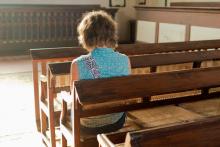
THIS IS NOT a column full of hand-wringing about the moral decay of U.S. society. Nor is it about my concern for the souls of my fellow citizens who are atheists, agnostics, or some other stripe of nonbeliever. I am worried about the growing number of religious “nones” in the United States, but not for those two reasons.
Let me be clear about something before continuing: Many of the people I love and admire most are religious “nones”—those who indicate “none of the above” on religious preference surveys. They include people of high intellect, great sensitivity, and deep character. In fact, many of them could give lessons in such areas to some of the religious people I know.
What they do not do is build hospitals, schools, colleges, or large social service agencies. Such institutions (when not built by the government) have generally been founded and supported by religious communities in the United States. This is not so much because religious people are always better human beings; it’s because religious communities value and organize such work at significant scale.
Religious communities play a profound role in U.S. civil society. About one out of every six patients in the U.S. is treated by Catholic hospitals. Most, if not all, have some sort of explicit commitment to serving the poor because of their faith identity. There are nearly 7,000 Catholic grade schools and high schools in the U.S., and more than 260 colleges. This is to say nothing of the refugee resettlement, the addictions counseling, or the services for homeless men and battered women provided by Catholic social service agencies.

AN ASTONISHING aspect of the miracle that was the Exodus is the recorded “600,000 men on foot, not counting their dependents” (Exodus 12:37). A whole people uprooted themselves and moved into the unknown. This was displacement on a massive scale. Their readiness to move from the security of slavery, from the only reality they had known for four-and-a half generations, was more awesome than the willingness of Pharaoh to let them leave.
What organizer today would not grasp at the key to a process that would move enslaved people in the Egypts of today? ... But this is still the beginning. The 40 years of wandering in the wilderness may have been a punishment for their constant complaining.
Surely there is a mine for silver, and a place for gold to be refined ... They put their hand to the flinty rock, and overturn mountains by the roots. They cut out channels in the rocks, and their eyes see every precious thing ... But where shall wisdom be found? —Job 28:1, 9-12
THE DIRT ROAD twists down into a gully at La Puya, Guatemala, and up the other side, slipping between the knee-high fields of holy corn. The river doesn’t run anymore at the bottom, but the butterflies gather in remembrance of the water of times past. Hundreds of them rest and then flutter suddenly up as a woman goes by to gather fresh basil or chipilin from the little herb and vegetable garden that grows in tires and the ground all along the blocked access road leading into the proposed gold-mine site.
La Puya is the curve in the road where a thorn tree used to stand, throwing fine sharp needles down on unsuspecting passersby. Now it is a well-ordered encampment of neighbors from the twin municipalities of San Pedro Ayampúc and San José del Golfo, 10 miles northwest of Guatemala City.
These women and men are here in a startling act of markedly Christian peaceable resistance. They have been at the gates around the clock and around the calendar since March 2, 2012, when a lone woman pulled her car across the access road to the mine, blocking some incoming machinery. Then a bus bumping down the main road stopped, and the passengers piled off when they saw what was happening.
Then more people came, and dozens stayed. They settled in for a long night that became a long season of resistance. Local communities had had enough of the obfuscation, lies, and manipulation from Radius Gold, a mining company based in Vancouver, Canada.

I noticed a loose thread in a blanket the other day and was reminded of something my mom always said: Never pull on a loose thread. All that will do is make it worse. It’ll yank on the other threads and wind up creating a knot. Even if you do manage to remove the one loose thread without doing too much damage to the fabric, it’ll leave a space that starts the nearby threads working their way loose, too.
Soon, the whole thing unravels. Removing even one thread from the fabric creates big problems.
Isn’t it the same with us?
Each of us is a thread woven into the fabric of our world. We’re looped around each other, pulled tightly to one another, intimately bound to one another. We’re so closely intertwined that we can’t be separated without making it all unravel.
By ourselves, we are a thread. Together, we are a blanket.
The weaver made it so.

I was down in Mexico a few years ago for a gathering of peers who are leading faith communities around the world. It was a rich time of conversation, encouragement, and visioning.
Walking through a local Mexican neighborhood between sessions, something struck me. While those of us in the Minority World (often called the 1st or Western World) are thinking and talking about our theology, most of the folks in the Majority World (often called the 3rd World) have no choice but to simply live into their theology. Talking about our theology, faith, and practice in lecture halls, church buildings, and conference rooms is a luxury that the vast majority of Jesus followers in the world have no opportunity to participate in.
It’s not necessarily a bad thing, but it is reality. And those of us with this luxury better own up to it, because it is easy for us in the West to think we have a corner on the market of theology, which we then project (whether consciously or subconsciously) onto the rest of the world. But who's to say theology built in academia is any more valid than theology build in the realities of everyday life?
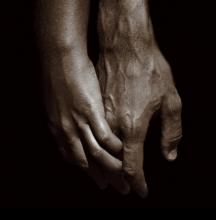
Beyond the realm of churches, religious blogs, and bible colleges, nobody really cares about theology. What does matter is the way you treat other people.
Within Christendom, we’re often taught the exact opposite: that doctrines, traditions, theologies, and distinct beliefs are the only things that do matter. It’s what separates churches, denominations, theologians, and those who are “saved” and “unsaved.”
Historically, Christians have been tempted to categorize the Bible into numerous sets of beliefs that are either inspired or heretical, good or bad, right or wrong — with no room for doubt or questioning or uncertainty.
It’s easy to get caught up in theorizing about God, but within our everyday lives reality is what matters most to the people around us. Theorizing only becomes important once it becomes relevant and practical and applicable to our lives.
When I'm sick, and you bring me a meal, I don't care whether you're a Calvinist or Arminian
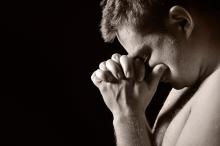
I’m asked pretty often what I see for the future of organized religion, and Christianity in the West in particular. Given the fact that I am in the process of completing a book called “ postChristian ,” some people make assumptions that I am convinced it’s all going away.
Granted, Christianity has experienced precipitous decline, and the drop-off likely is far from done. Before we see any leveling-off within the institutional church, there will be many more church closures, consolidation of shrinking denominations, and an increasing number of people called to, and already working in, ministry who supplement their income with some non-ministerial side vocation.
So what do we, who still operate within the system of a declining religion, do about our situation? Some of this has little or nothing to do with anything the church has done or can do. Our increasingly distributed, decentralized, and accelerated culture has forced churches out of the center of American social life. Also, changing cultural norms have made it much more socially acceptable not to go to church.
I’ve long suggested that many of the folks filling the pews during the so-called heyday of the Church some 40 to 60 years ago were there under some duress. They went because of community pressure to do so, because their spouses made them, or because it was a great place to do business networking. But honestly, were we any better off as a faith to have our buildings full if the folks who were there didn’t really want to be there?